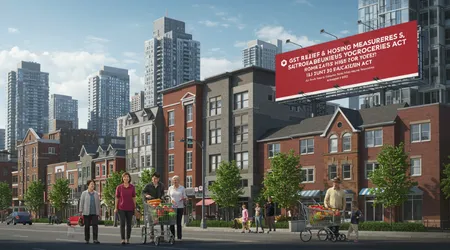GST Relief & Housing Measures: Affordable Housing and Groceries Act Impacts You

GST Relief & Housing Measures dominate Canada’s financial landscape in 2025, offering tangible support amid soaring living costs.
The Affordable Housing and Groceries Act, first introduced in 2023 and expanded in 2025, aims to ease the burden of inflation and housing affordability.
This legislation, a cornerstone of the Liberal government’s economic strategy, removes GST on new rental housing and boosts competition to stabilize grocery prices.
For Canadians grappling with rent hikes and grocery bills, these measures signal hope. But how do they translate into real savings, and are they enough to address the deeper economic challenges?
This article unpacks the Act’s impact, diving into its benefits, limitations, and practical implications for households nationwide.
The Act’s evolution reflects Canada’s urgent need to address affordability. In 2023, it laid the groundwork by eliminating GST on new rental construction, spurring developers to build.
By 2025, additional GST Relief & Housing Measures extend support to first-time homebuyers and low-income families. With inflation still pinching, these policies aim to put money back into pockets.
From Vancouver’s sky-high rents to Halifax’s rising grocery costs, the Act targets everyday expenses. Yet, questions linger: will these measures truly reshape Canada’s economic reality, or are they a temporary fix for systemic issues?
Understanding the Affordable Housing and Groceries Act
The Affordable Housing and Groceries Act, passed in 2023, gained royal assent on December 15, 2023, and has since expanded. It initially removed GST on new rental housing to incentivize construction.
In 2025, it includes GST Relief & Housing Measures like the First-Time Home Buyers’ GST Rebate. This rebate, part of Bill C-4, offers up to $50,000 in tax relief for new homes valued up to $1.5 million.
The goal? Make homeownership accessible and boost housing supply.
Beyond housing, the Act tackles grocery prices by modernizing competition laws. It empowers regulators to curb price-fixing by major grocers, aiming to stabilize costs.
For families, this means potential savings on essentials like milk and bread. The Canada Revenue Agency (CRA) also administers enhanced GST/HST credits, with a 2.7% increase starting July 2025. These tax-free payments help low-income households offset sales taxes.
++ Inflation & Trade Risk to Economy: Could Canadian Banks Tighten Lending Soon?
However, the Act isn’t a cure-all. While it encourages rental construction, high land costs and zoning restrictions still limit supply. Grocery price stabilization depends on enforcement, which remains untested.
Canadians need clarity on how these policies translate to daily life, especially in high-cost cities.
The Act’s housing focus centers on new builds, leaving existing homeowners unaffected. For renters, GST exemptions could lower rents indirectly, but results take time.
Meanwhile, grocery price measures face skepticism, as corporate compliance isn’t guaranteed. The Act’s ambition is clear, but its execution demands scrutiny.

GST Relief for First-Time Homebuyers
Imagine saving thousands on your first home sounds like a lifeline, right? The First-Time Home Buyers’ GST Rebate, introduced via Bill C-4 on June 5, 2025, makes this possible.
It eliminates GST on new homes up to $1 million and reduces it for homes between $1 and $1.5 million. Eligible buyers could save up to $50,000, a game-changer in markets like Toronto.
For example, Sarah, a 28-year-old teacher in Vancouver, buys a $900,000 condo. Without GST, she saves $45,000, easing her mortgage burden.
But there’s a catch: only agreements signed after May 27, 2025, qualify. Buyers like John, who signed earlier, miss out, sparking frustration. The rebate applies to new builds completed before 2036, pushing developers to act fast.
Also read: AI Tax Credits & Clean Tech Incentives: How Businesses Can Leverage 2025 Savings
The rebate’s impact is significant but limited. It targets first-time buyers, excluding investors or second-home purchases.
In high-cost cities, $1.5 million barely covers a starter home, narrowing the pool of beneficiaries. Still, the policy could spur 23,000 housing starts annually, per Altus Group’s 2025 analysis.
Yet, critics argue it may inflate prices if supply doesn’t keep pace. Developers must navigate tight timelines, with construction starting before 2031.
For buyers, the rebate offers relief, but systemic barriers like high interest rates persist. It’s a step forward, not a leap.
Enhanced GST/HST Credits for Low-Income Households
For low-income Canadians, every dollar counts. The GST/HST credit, a quarterly tax-free payment, sees a 2.7% boost starting July 4, 2025.
Single individuals can receive up to $533 annually, while couples get up to $698. Families with children under 19 gain an extra $184 per child.
Take Maria, a single mother in Halifax with two kids. Her 2025 credit of $901 helps cover groceries and utilities.
The CRA automatically calculates eligibility based on 2024 tax returns, requiring no extra paperwork. This simplicity ensures 11 million Canadians benefit yearly.
Read more: Tax Toolkit 2025: New CPP, TFSA, HBP Limits and Capital Gains Deferral Strategies
However, the 2.7% increase lags behind inflation’s bite. Groceries and rent continue to strain budgets, making the credit feel modest.
While it offsets sales taxes, it doesn’t address broader cost-of-living pressures. The CRA’s July 2025 payment, including a one-time $250 top-up, offers temporary relief.
The credit’s reach extends to newcomers, like international students and refugees, broadening its impact. Yet, for many, it’s a bandage on a deeper wound. Rising rents and food costs demand more robust solutions, leaving households wanting.
The one-time $250 payment, issued July 5, 2025, targets immediate needs. But without sustained increases, its impact fades.
Policymakers must balance short-term aid with long-term fixes, like addressing supply chain issues driving inflation.
Grocery Price Stabilization Efforts
Grocery bills hit hard, and the Act aims to soften the blow. By strengthening competition laws, it targets price-fixing by major grocers.
In 2025, regulators gain tools to penalize anti-competitive practices, aiming to lower costs for essentials like eggs and produce.
Consider a family in Winnipeg spending $1,200 monthly on groceries. If competition reforms cut prices by 5%, they save $60 monthly real money for tight budgets.
But enforcement is key. Past scandals, like bread price-fixing, show grocers can skirt accountability.
The Act’s grocery measures build on 2023 reforms, but results remain uncertain. Inflation eased slightly in 2025, yet food costs rose 3.2% year-over-year, per Statistics Canada. Without aggressive oversight, savings may not materialize.
Skeptics point to corporate lobbying as a hurdle. Major chains dominate Canada’s grocery market, limiting competition. The Act’s success hinges on regulators’ resolve to challenge these giants. For now, families await tangible relief at checkout.
Smaller grocers could benefit from fairer competition, offering consumers more choices. But rural areas, with fewer stores, may see slower change. The Act’s promise is bold, but its delivery needs vigilance to truly impact budgets.
Broader Economic Implications
GST Relief & Housing Measures ripple beyond individual wallets. By spurring housing construction, the Act could create jobs 41,000 in the Greater Toronto Area alone, per Altus Group. But inaction risks a 60% drop in housing starts by 2027, threatening economic stability.
The grocery measures aim to curb inflation’s sting, but their success depends on execution. If prices stabilize, consumer confidence could rise, boosting spending. Yet, raising GST rates to fund other priorities, like defense, looms as a risk.
For businesses, GST Relief & Housing Measures offer clarity. Developers gain incentives to build, while grocers face pressure to compete. However, high land costs and regulatory hurdles could blunt housing gains, especially in urban centers.
The Act’s focus on low-income households aligns with fairness goals. But without addressing root causes like zoning laws or supply chain inefficiencies its impact may wane.
Canadians need policies that tackle systemic issues, not just symptoms.
Think of the economy as a house: GST Relief & Housing Measures patch the roof, but the foundationhousing supply and market competition needs rebuilding. Long-term affordability requires bold, coordinated action across sectors.
Practical Tips for Maximizing Benefits
Navigating GST Relief & Housing Measures requires strategy. First-time homebuyers should time purchases post-May 27, 2025, to qualify for the FTHB GST Rebate. Check CRA’s My Account for credit updates. File 2024 taxes promptly to secure GST/HST payments.
For renters, ask landlords about GST-exempt new builds savings could lower rents. Shop at smaller grocers to support competition and potentially find better deals. Stay informed via CRA updates to avoid missing payments.
Buyers should consult builders to confirm rebate eligibility. Co-owning with a non-first-time buyer may disqualify you, so plan carefully. For groceries, compare prices across stores to maximize savings as competition reforms take effect.
Keep records of tax filings and purchase agreements. Errors can delay credits or rebates. If unsure, consult a tax professional to navigate eligibility rules. Proactive planning ensures you capture every dollar of relief.

Looking Ahead: Challenges and Opportunities
The Act’s GST Relief & Housing Measures offer a lifeline, but challenges persist. Housing supply lags demand, with starts down 25% in Q1 2025. Rebates help, but high interest rates deter buyers. Policymakers must address these barriers.
Grocery reforms face resistance from corporate giants. Strong enforcement is critical to deliver savings. Rural communities, with limited store options, need targeted support to feel the Act’s benefits. Innovation in supply chains could amplify results.
Opportunities abound, though. Increased construction could stabilize rents long-term. Enhanced credits provide immediate relief for millions. If competition reforms succeed, grocery prices could ease, freeing up household budgets.
The Act’s success hinges on execution. Canadians deserve transparency on progress, from housing starts to price reductions. Engaging communities in policy feedback can refine these measures, ensuring they meet real needs.
Conclusion
GST Relief & Housing Measures through the Affordable Housing and Groceries Act mark a pivotal step toward affordability in 2025.
From GST rebates saving first-time buyers thousands to enhanced credits easing low-income budgets, the Act delivers targeted relief.
Yet, its scope limited by supply constraints and enforcement challenges raises questions about long-term impact.
Will these measures reshape Canada’s economic future, or merely soften the edges of a deeper crisis? By filing taxes, timing purchases, and supporting competition, Canadians can maximize benefits.
The Act is a tool, not a cure. Staying informed and engaged ensures you make the most of these changes while pushing for bolder solutions.
| GST/HST Credit Amounts for 2025-2026 | Annual Amount |
|---|---|
| Single Individual | $533 |
| Married/Common-Law Couple | $698 |
| Per Child (Under 19) | $184 |
Frequently Asked Questions
Who qualifies for the First-Time Home Buyers’ GST Rebate?
First-time buyers purchasing new homes valued up to $1.5 million, with agreements signed after May 27, 2025, qualify. The home must be your primary residence.
How do I receive the enhanced GST/HST credit?
File your 2024 tax return. The CRA automatically calculates eligibility based on income and household size, with payments starting July 4, 2025.
Will grocery prices drop immediately?
Not likely. Competition reforms take time, and enforcement is key. Shop at smaller stores and compare prices to maximize savings.
Can I claim the GST rebate if I co-own with a non-first-time buyer?
Possibly, but eligibility may be affected if your co-owner has previously owned a home. Consult a tax professional to confirm.
What if I signed a home purchase agreement before May 27, 2025?
You’re ineligible for the FTHB GST Rebate, as it applies only to agreements post-May 27, 2025, for homes completed before 2036.
